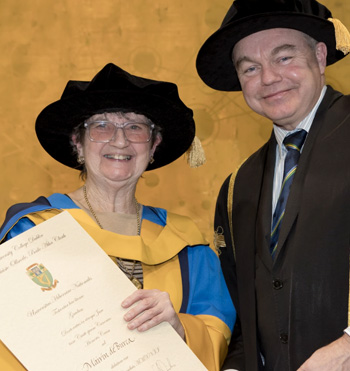Mairin deBurca
UNIVERSITY COLLEGE DUBLIN
HONORARY CONFERRING
5 December 2017 at 2 pm
TEXT OF THE INTRODUCTORY ADDRESS DELIVERED BY ASSOCIATE PROFESSOR KEVIN COSTELLO, UCD School of Law on 5 December 2017, on the occasion of the conferring of the Degree of Doctor of Laws, honoris causa on MÁIRÍN deBURCA
_____________________________________________________________________
President, distinguished guests, graduates, ladies and gentlemen
 Historians of the twentieth century refer to the ‘long 1960s’ as the period between the late 1950s and the mid 1970s. The leading British historian of the 1960s, Arthur Marwick, has identified, as one of the characteristics of the long 1960s, the development of ‘new concerns for civil and personal rights and a willingness to become involved in often risky action on behalf of these’.
Historians of the twentieth century refer to the ‘long 1960s’ as the period between the late 1950s and the mid 1970s. The leading British historian of the 1960s, Arthur Marwick, has identified, as one of the characteristics of the long 1960s, the development of ‘new concerns for civil and personal rights and a willingness to become involved in often risky action on behalf of these’.
The social justice activist, and litigant, Máirín de Burca is perhaps the foremost exemplar of that phenomenon in Irish history.
Máirín first came to public prominence as a co-founder in 1967 of the Dublin Housing Action Campaign. Dublin was experiencing a housing crisis: over 5,000 persons awaited housing; and there were mass evictions. (A 1969 government press release blamed this crisis on, amazingly, ‘decades of neglect by the British Administration’). With the help of sympathetic construction workers, the Campaign fitted out unoccupied houses for hundreds of families.
In 1971, while engaged in a housing campaign-related demonstration, Máirín and the journalist Mary Anderson, non-violently resisted an order to disperse. This resulted in prosecution. The jury which would try the defendants would be one empanelled under the Juries Act 1927. The 1927 Act excluded two groups from jury service: first, persons who were not householders; and, second, effectively, women. The two accused challenged the constitutionality of these limitations. Expert evidence presented by Dr Brendan Walsh (subsequently UCD Professor of National Economics) established that only two women had ever managed to serve on a post 1927 Act jury. Their barrister, Donal Barrington (also a recipient of this honorary degree) argued that an accused had a constitutional right to a jury which was genuinely socially representative. The Supreme Court agreed that a jury which was confined to male householders was clearly not representative, and was inconsistent with Constitution.
In availing of the courts as a tactic for achieving national and civil rights, Máirín was following a well-established political tradition. In 1921, the Irish Independence movement brought final victory against the British closer when in Egan v Macready (1921), the High Court ruled that the use of martial law was unlawful.
Part of the fabric of UCD life, as lecturer and speaker, for nearly fifty years, a 1970’s law student recalls Máirín’s debating style as ‘forensic, making strong evidence-based arguments for social justice in a terse and modest way’. A talented administrator, and journalist, Máirín led a whole series of campaigns. She campaigned against apartheid. She was one of the drafters of the Women’s Liberation Movement manifesto, Chains or Change. As a member of ‘Irish Voice on Vietnam’ she led the Irish campaign against the war and President Nixon’s 1970 visit. She was a founder of the Prisoners’ Rights Organisation in 1973. She campaigned for a minimum wage. Throughout, she served as general secretary of the political movement that would evolve into the Workers Party. In late 1971, she developed a wholly pacifist position, confronting those pockets of opinion which continued to support political violence.
Arthur Marwick’s study of the 1960s proposes the thesis of ‘measured judgment’: the notion that radical ideas, which were originally regarded as exotic, were rapidly adopted by official opinion, and are now regarded as elementary. Even US Secretaries of State acknowledge that the Vietnam war was a tragic mistake; Nelson Mandela is honoured with a statue in Parliament Square; President Nixon was disgraced; there is now an advanced case law on prisoners’ rights. But it is debatable whether these advances would have been achieved so rapidly, without the physical self-sacrifice incurred by some. In August 1971, the High Court ordered that Máirín be committed indefinitely for protecting the identity of a homeless family which was occupying a house in Gardiner Street. In a protest, against the Vietnam War, she and a group of anti-war activists poured two bottles of cow’s blood on the steps of the US embassy. They then waited patiently to be arrested and were duly prosecuted under the Diplomatic Immunities Act 1967. Máirín was sentenced to three months’ imprisonment.
A newspaper described her in court, ‘looking as if she has been in a hotel rather than prison, she is pleasant and unflurried’. And her sense of principle was acknowledged by many of those who did not share her politics. The Supreme Court judge, Richard McLoughlin was on the more conservative wing of the Supreme Court, and is now a fairly overlooked figure. He found against her in the Dublin Housing Action-related case Keegan v De Burca (1973). He ended his judgment with this coda; its sentiments typified the regard in which Máirín was held - and continues to be held - by swathes of Irish public opinion:
I admire Máirín de Burca for her humanity and compassionate concern for the under-privileged, and admire her for her courage in sacrificing her liberty on their behalf.
Praehonorabilis Praeses, totaque Universitas,
Praesento vobis hanc meam filiam, quam scio tam moribus quam doctrina habilem et idoneam esse quae admittatur, honoris causa, ad Gradum Doctoratus in utroque Jure, tam Civili quam Canonico; idque tibi fide mea testor ac spondeo, totique Academiae.